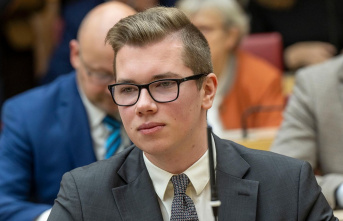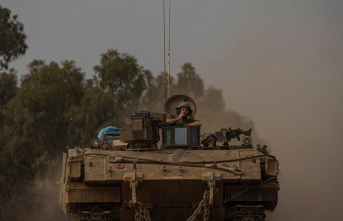With 736 seats, the current Bundestag is the largest of all time - and thus replaced the previous one in 2021. Until then, he held the record with 709. Parliament has been growing for years and is far from the 598 seats it should have. The traffic light coalition has now agreed on a draft law for a new Bundestag electoral law. As already announced, according to the text that was available to the AFP news agency in Berlin on Sunday, the number of seats will be fixed at the previous standard of 598. The controversial replacement vote for direct mandates is no longer included in the template.
The draft law has now been "agreed between the coalition factions," according to a letter from SPD faction leader Rolf Mutzenich to the SPD deputies. "With the draft law, we are achieving the three most important goals: reducing the size of the Bundestag and a guaranteed size of 598 seats, the Bundestag reflects exactly the election result and fairness towards all parties," SPD domestic politician Sebastian Hartmann told the two Stuttgart newspapers. According to the proposal, all 299 constituencies should be retained. Most recently, the standard size of the Bundestag was massively exceeded several times, there are currently 736 MPs.
This is due to the so-called overhang and compensation mandates. An overhang mandate occurs when a party wins more constituencies than it is entitled to seats in the Bundestag based on the second vote result. According to the current legal situation, all constituency winners move into the Bundestag. However, the composition of the parliament should still correctly reflect the result of the second vote. Therefore, in the case of overhang mandates, there are compensation mandates for the other parties.
The traffic light draft envisages that there will be no more overhang mandates - and thus no compensation mandates either. The 598 seats in the Bundestag are to be allocated entirely based on the majority of votes for the parties. This previous second vote should therefore be the first on the ballot paper in the future and called the main vote. The previous first vote should be called the constituency vote.
After the election, according to the draft, the seats to which the parties are entitled in the Bundestag will be converted to the federal states as before. In the individual country, the party's successful constituency candidates are the first to have their say. If mandates are still to be awarded after that, it is the turn of the candidates on the state list.
There is a ranking for the constituency winners of each party - whoever gets the most votes is at the top. The Bundestag mandates are distributed according to this ranking. If the party records more constituency gains than it is entitled to according to the main vote distribution, the constituency winners who got particularly few votes look down the drain.
The traffic light fractions consider this unlikely. They point out that there are usually several MPs from one constituency. However, it is possible that a constituency winner does not make it into the Bundestag and that this constituency is then exclusively represented by MPs from other parties.
The Union is outraged. She is bothered by the possibility of remaining without a Bundestag mandate as a constituency winner. In particular, the CSU, which wins many direct mandates and therefore benefits from overhang mandates, sees a "disregard for the will of the electorate" and a violation of the Basic Law.
Actually, there should only be 280 instead of 299 constituencies for the 2025 federal election - this provides for a law passed by the previous black-red coalition. At that time, too, the aim was to bring the Bundestag more in the direction of the standard size. However, there would still have been overhang and compensation mandates. The traffic light coalition now wants to reverse the constituency reduction.
In an earlier reform draft by the SPD, Greens and FDP, a substitute vote was provided for the constituency candidates. Here the voters could have indicated a second preference. If a constituency winner does not get a chance, the one with the most first and alternate votes would move into the Bundestag. The coalition has now said goodbye to this controversial idea.
Meanwhile, the Union is flirting with so-called trench voting rights. This would mean that half of the Bundestag seats would be allocated via the second vote and the other half via the vote for direct candidates. However, such a model is likely to ensure that the distribution of seats in parliament differs greatly from the result of the second vote.











